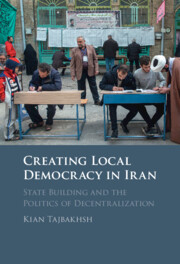‘Kian Tajbakhsh's study of local government under the Islamic Republic of Iran is based on careful and painstaking analysis of administrative and legal documents and is unmatched by any in current Iranian history.’
Saïd Amir Arjomand - State University of New York
‘This deeply personal and academically rigorous account of the efforts to advance political decentralization in Iran raises critical questions for scholars of governance and democracy. By documenting how decentralization was as likely to be embraced by supporters of centralized state power as by reform advocates or even pragmatic technocrats, we are shown the complexities inherent in building democracy from the ground up.’
Diane E. Davis - Harvard University
‘Kian Tajbakhsh’s understanding of Iran is manifest on every page of this book. He convincingly argues, much to his own discontent, how the authoritarian regime consolidates its rule through political decentralization. His work is important for anyone interested in local democracy – a powerful read.’
Peter Knip - Director of VNG International
‘Kian Tajbakhsh beautifully documents the tragedy of municipal democracy in Iran, from its hopeful beginnings in the mid-1990s to its defeat a decade later. Tajbakhsh was both a scholarly observer of the democratization movement and a participant, whose detention in Iran delayed this long-awaited book for years.’
Charles Kurzman - University of North Carolina
‘In this unusually revealing account of decentralization efforts in Iran, Tajbakhsh provides a deeply researched and often moving account of how contemporary politics in Iran actually works.’
Lisa Anderson
Source: Foreign Affairs
‘… a welcome and much-needed addition to the developing corpus of expert literature on local democracy. In the broader context, the book provides an in-depth, fascinating case study on how, when, and why authoritarian regimes opt for decentralization and employ democratic tools to achieve their nondemocratic goals.’
Nikouei Nikouei
Source: Middle East Journal
‘The book stands out as an excellent intellectual exercise in combining theory and data to make sense of socio-political developments.'
Ammar Khan Nasir
Source: The Muslim World Book Review
‘The value of the book is that it is both academically analytical and also a personal account of good intentions leading to the usual destination. It gives details of local budgets and elections, followed by the author’s empirical observations of the results, with revealing interviews with many senior and mid level government officials. Political scientists will find the analysis useful, while the personal insights will give those with a general interest in the interior workings of Iran a view not easily obtainable elsewhere.’
Antony Wynn
Source: Asian Affairs



